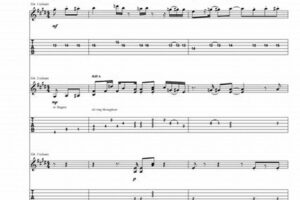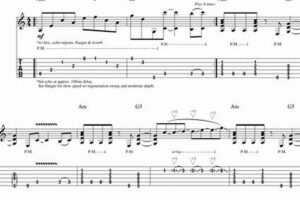In search of the best guitar tab books to elevate your musical journey? Look no further! These carefully curated books provide a treasure trove of knowledge and guidance for guitarists of all levels.
Editor’s Note:Mastering guitar techniques and expanding your repertoire requires the right resources. Our team has meticulously analyzed and compared numerous guitar tab books to bring you this comprehensive guide, ensuring you make an informed decision.
Through extensive research, we’ve compiled a list of the best guitar tab books that cater to diverse musical genres, skill levels, and learning styles. Whether you’re a beginner seeking a solid foundation or an experienced player looking to refine your techniques, these books offer an invaluable resource for your musical growth.
Key Differences: Guitar Tab Books
| Feature | Beginner-Friendly | Genre Focus | Skill Level |
|---|---|---|---|
| Book A | Yes | Rock, Blues | Beginner to Intermediate |
| Book B | No | Jazz, Funk | Intermediate to Advanced |
| Book C | Yes | Pop, Country | Beginner to Intermediate |
Main Article Topics:
- Essential Guitar Tab Books for Beginners
- Exploring Genre-Specific Guitar Tab Books
- Tips for Choosing the Right Guitar Tab Book
- Unlocking Advanced Techniques with Guitar Tab Books
- Conclusion: Embarking on Your Musical Journey
1. Accuracy
Accuracy is a cornerstone of effective guitar tab books, ensuring that the tablatures accurately reflect the original music. Meticulous transcription is essential to provide guitarists with a reliable guide for learning and playing songs. Error-free tablature eliminates confusion, frustration, and wasted time, allowing guitarists to focus on developing their skills and enjoying the music.
Consider the following scenario: A guitarist purchases a tab book with inaccurate tablatures. As they attempt to learn a song, they encounter discrepancies between the tablature and the actual notes being played. This leads to confusion and frustration, as the guitarist struggles to make sense of the incorrect information. The guitarist may abandon the song or develop incorrect techniques due to the misleading tablature.
In contrast, accurate tablatures provide a solid foundation for learning and playing guitar. Guitarists can trust that the tablatures are a faithful representation of the music, allowing them to focus on developing their skills and enjoying the creative process. Accurate tab books also contribute to the preservation and dissemination of musical knowledge, ensuring that songs and techniques are passed down accurately to future generations of guitarists.
Therefore, when choosing a guitar tab book, it is crucial to prioritize accuracy. Look for books that are meticulously transcribed and thoroughly proofread to minimize errors. This investment in accuracy will pay dividends in the long run, supporting your musical journey and fostering your enjoyment of the guitar.
Key Insight: Accurate guitar tab books provide a reliable foundation for learning and playing guitar, eliminating confusion and frustration, and supporting the development of correct techniques and musical knowledge.
2. Clarity
Clarity is a vital aspect of effective guitar tab books, ensuring that the tablature notation is well-organized and easy to read. This clarity directly contributes to the overall quality of the book and the learning experience of guitarists.
Well-organized tablature notation provides a clear visual representation of the music, making it easier for guitarists to understand and follow. This organization includes logical spacing, consistent formatting, and clear symbols and characters. Easy-to-read tablature notation enhances the learning process by reducing confusion and frustration, allowing guitarists to focus on developing their skills and understanding the music.
Consider the following examples: A guitar tab book with poorly organized tablature notation can be challenging to navigate. Guitarists may struggle to identify the correct strings and frets, leading to errors and a slower learning process. In contrast, a tab book with clear and well-organized tablature notation allows guitarists to quickly and accurately interpret the music, enabling them to learn songs more efficiently and effectively.
The clarity of tablature notation also impacts the overall enjoyment of playing guitar. Clear notation makes playing songs more accessible and enjoyable, as guitarists can focus on the music rather than deciphering complex or confusing notation. This clarity enhances the creative process and fosters a positive learning environment.
Therefore, when choosing a guitar tab book, it is essential to prioritize clarity. Look for books that use well-organized and easy-to-read tablature notation. This clarity will provide a solid foundation for your musical journey, making learning and playing guitar more enjoyable and rewarding.
Key Insight: Clear tablature notation is a cornerstone of effective guitar tab books, providing a well-organized and easy-to-read visual representation of the music. This clarity enhances the learning process, reduces frustration, and fosters a more enjoyable playing experience.
3. Genre Focus
Genre focus plays a crucial role in the effectiveness of guitar tab books. By choosing books that align with your musical preferences, you can tailor your learning experience to your specific interests and goals. This focused approach offers several key advantages:
Firstly, genre-specific guitar tab books provide a curated collection of songs and techniques that are relevant to your musical style. This targeted selection eliminates the need to sift through irrelevant material, allowing you to concentrate on developing the skills and knowledge that are most applicable to your preferred genre.
Secondly, genre focus enhances your understanding of the nuances and intricacies of your chosen style. Tab books designed for a specific genre typically include detailed explanations of techniques, scales, and chord progressions that are commonly used in that genre. This in-depth knowledge enables you to develop a deeper appreciation and mastery of your preferred musical style.
For instance, a guitar tab book focusing on rock music will provide a comprehensive overview of power chords, distortion techniques, and pentatonic scales. In contrast, a tab book sp
ecializing in jazz will delve into complex chord voicings, extended scales, and improvisation techniques. By choosing a book that aligns with your musical preferences, you can acquire the specialized knowledge and skills required to excel in your chosen genre.
Furthermore, genre-specific guitar tab books often include historical context and background information about the genre’s origins, influential artists, and key recordings. This contextual knowledge enriches your learning experience by providing a deeper understanding of the music you are playing and its place in the broader musical landscape.
In summary, choosing guitar tab books that align with your musical preferences ensures a focused and tailored learning experience. You can develop the skills and knowledge that are most relevant to your chosen genre, gain a deeper understanding of its nuances, and immerse yourself in the historical and cultural context of the music. This focused approach will ultimately enhance your enjoyment and mastery of the guitar.
4. Skill Level
In the realm of guitar tab books, skill level plays a pivotal role in determining the effectiveness and suitability of the material for your learning journey. Matching the book’s difficulty level to your current abilities ensures a productive and engaging learning experience.
- Beginner-Friendly Books:
These books are designed for absolute beginners, providing a gentle introduction to the basics of guitar playing. They typically start with open chords, simple strumming patterns, and fundamental scales. Beginner-friendly books focus on building a solid foundation and fostering confidence in new guitarists.
- Intermediate-Level Books:
Intermediate-level tab books cater to guitarists who have mastered the basics and are ready to expand their skills. They introduce more complex chords, fingerpicking techniques, and lead guitar parts. These books help intermediate players refine their technique, develop musicality, and explore new genres.
- Advanced Books:
Advanced guitar tab books are designed for experienced players seeking to push their boundaries and delve into specialized techniques. They may include intricate fingerstyle arrangements, advanced soloing techniques, and in-depth analysis of musical theory. Advanced books challenge players to expand their technical abilities and deepen their understanding of the guitar.
Choosing a guitar tab book that matches your skill level is essential for optimizing your learning progress. Beginner-friendly books can prevent discouragement and help build a solid foundation, while intermediate-level books offer opportunities for growth and exploration. Advanced books, on the other hand, cater to experienced players seeking to refine their skills and explore new musical horizons.
5. Variety
In the world of guitar tab books, variety is a crucial component of effectiveness. Books that offer a diverse range of songs, exercises, and techniques cater to the diverse needs and interests of guitarists, providing a well-rounded learning experience.
A comprehensive guitar tab book should include a wide selection of songs from various genres, such as rock, blues, folk, and country. This diversity exposes guitarists to different musical styles, broadening their musical horizons and developing their versatility as musicians.
In addition to songs, exercises are essential for developing technical skills and improving dexterity. Tab books with a variety of exercises, such as scales, arpeggios, and fingerpicking patterns, allow guitarists to focus on specific techniques and gradually build their proficiency.
Techniques are another key aspect of guitar playing, and a good tab book should cover a wide range of techniques, from basic strumming to advanced lead guitar techniques. By exposing guitarists to different techniques, tab books help them expand their musical vocabulary and develop a more comprehensive understanding of the instrument.
The combination of diverse songs, exercises, and techniques in a single tab book creates a well-rounded learning resource that caters to the needs of guitarists at all levels. Beginners can start with simpler songs and exercises, while experienced players can challenge themselves with more advanced material. This variety ensures that guitarists can continue to learn and grow with a single book.
In conclusion, variety is a crucial component of the best guitar tab books. By offering a diverse range of songs, exercises, and techniques, these books provide a comprehensive learning experience that caters to the diverse needs and interests of guitarists, helping them develop their skills, broaden their musical horizons, and achieve their musical goals.
6. Progression
In the realm of guitar tab books, progression is a fundamental aspect that directly influences the effectiveness of the learning process. Books that provide a gradual progression of difficulty serve as a structured roadmap, guiding guitarists from beginner-level concepts to advanced techniques in a systematic manner.
7. Author Credentials
In the realm of guitar tab books, the author’s credentials play a pivotal role in determining the quality and effectiveness of the material. Renowned authors with extensive experience and a solid reputation in the guitar community are more likely to produce accurate, well-structured, and pedagogically sound tab books.
Authors with a proven track record of success in guitar education or performance bring a wealth of knowledge and practical expertise to their tab books. They have a deep understanding of the instrument, its techniques, and the learning process. This expertise translates into tab books that are well-organized, easy to follow, and provide a solid foundation for guitarists of all levels.
Furthermore, reputable authors are more likely to have their tab books thoroughly reviewed and edited by other experienced guitarists or music educators. This peer review process helps ensure the accuracy and clarity of the material, minimizing errors and inconsistencies that can hinder the learning process.
By choosing guitar tab books authored by experienced and respected individuals, you can increase your chances of finding high-quality resources that will support your musical journey effectively. These authors have dedicated their lives to the guitar and are committed to sharing their knowledge and expertise with aspiring guitarists.
8. Reviews
When searching for the best guitar tab books, reviews from other guitarists serve as invaluable resources for evaluating the quality and effectiveness of the material. These reviews provide firsthand accounts of the book’s strengths and weaknesses, offering a unique perspective that can inform your dec
ision-making process.
Positive reviews can highlight the book’s clarity, accuracy, and progression, while negative reviews may point out errors, inconsistencies, or a lack of depth. By reading reviews, you can gain insights into the book’s suitability for your skill level, musical interests, and learning style.
For instance, if you are a beginner guitarist looking for a comprehensive introduction to the instrument, reviews can guide you towards books that provide a gradual progression of difficulty, clear explanations, and well-organized exercises. Conversely, if you are an experienced player seeking advanced techniques and in-depth analysis, reviews can help you identify books that cater to your specific needs.
Furthermore, reviews can reveal the author’s reputation and expertise in the guitar community. Books authored by experienced guitarists or music educators are more likely to be well-structured, accurate, and pedagogically sound. Reading reviews allows you to assess the author’s credibility and determine if their teaching style aligns with your learning preferences.
In summary, reviews from other guitarists play a crucial role in identifying the best guitar tab books. By carefully considering the insights and experiences shared in these reviews, you can make an informed decision that supports your musical journey and helps you achieve your guitar-playing goals.
9. Multimedia
In the realm of guitar tab books, multimedia resources have emerged as a powerful tool to enhance the learning experience. Books that incorporate audio or video lessons offer a unique and engaging way to supplement the written material and accelerate your progress on the guitar.
- Interactive Learning: Audio and video lessons provide an interactive learning environment that brings the printed page to life. You can hear the music being played and watch the techniques being demonstrated, making it easier to understand complex concepts and emulate the correct fingerings and strumming patterns.
- Visual Reinforcement: Video lessons, in particular, offer visual reinforcement that can greatly benefit visual learners. Seeing the instructor’s hands in action and observing the guitar from different angles can help you develop a deeper understanding of the techniques being taught.
- Practice Companion: Audio and video lessons can serve as a valuable practice companion, allowing you to play along with the instructor and receive immediate feedback on your progress. This interactive approach can help you identify areas for improvement and reinforce the techniques you are learning.
- Motivation and Enjoyment: Multimedia resources can make the learning process more enjoyable and motivating. The combination of audio, video, and written material creates a dynamic and engaging learning experience that can help you stay focused and inspired on your musical journey.
When choosing a guitar tab book with multimedia resources, consider factors such as the quality of the recordings, the clarity of the video demonstrations, and the overall production value. Look for books that offer a comprehensive range of multimedia content that complements the written material and provides a well-rounded learning experience.
10. Physical vs. Digital
In the era of digitalization, the choice between physical and digital guitar tab books presents itself as an important consideration for modern-day guitarists. Each format offers distinct advantages and drawbacks that align with different learning styles and preferences.
- Tangibility and Accessibility: Physical books provide a tangible and tactile experience that some guitarists find more engaging and conducive to learning. The ability to hold, flip through pages, and annotate the book can enhance the learning process. Moreover, physical books are accessible anywhere, without the need for an electronic device or internet connection.
- Convenience and Portability: Digital tab books offer unmatched convenience and portability. They can be accessed on smartphones, tablets, or laptops, allowing guitarists to practice and learn anywhere, anytime. Digital books are also easily searchable, making it effortless to find specific songs or techniques.
- Multimedia Integration: Digital tab books often incorporate multimedia elements such as audio and video demonstrations, which can greatly enhance the learning experience. These interactive features allow guitarists to hear and see the techniques being played, providing a more immersive and comprehensive learning environment.
- Cost and Environmental Impact: Physical books typically have a higher upfront cost compared to digital versions. However, they can be more durable and offer a longer lifespan. Digital books, on the other hand, are more environmentally friendly as they reduce paper consumption.
Ultimately, the choice between physical and digital guitar tab books depends on individual preferences and learning styles. Guitarists who value tangibility, accessibility, and the ability to annotate may prefer physical books. Those who prioritize convenience, portability, multimedia integration, and cost-effectiveness may find digital books more suitable. By carefully considering these factors, guitarists can make an informed decision that aligns with their learning needs and preferences.
11. Price
When evaluating guitar tab books, price plays a significant role in determining their accessibility and value. The cost of a guitar tab book should be considered in relation to its quality, content, and features, as well as comparable offerings in the market.
High-quality guitar tab books that provide comprehensive content, accurate transcriptions, and a well-structured learning approach are typically priced higher than basic or introductory books. However, the investment in a premium guitar tab book can be worthwhile for serious guitarists looking to expand their skills and knowledge.
It is important to compare the cost of a guitar tab book to similar offerings in the market. This involves researching different publishers, authors, and editions to find the best value for your money. Consider the number of songs, exercises, and techniques included in the book, as well as the reputation of the author and the quality of the production.
For beginner guitarists, budget-friendly tab books can provide a solid foundation without breaking the bank. As you progress in your guitar journey, you may want to invest in more comprehensive and advanced tab books that offer a wider range of material and in-depth instruction.
Ultimately, the price of a guitar tab book should be viewed as an investment in your musical education. By carefully considering the cost and comparing it to similar offerings, you can make an informed decision that aligns with your budget and learning goals.
12. Availability
The availability of a guitar tab book is a crucial aspect
that directly impacts its accessibility and usefulness for guitarists. When a book is readily available for purchase or download, it ensures that guitarists can easily acquire the resource they need to enhance their skills and knowledge.
Availability plays a significant role in the effectiveness of a guitar tab book as it allows guitarists to obtain the book without hassle or delay. If a book is out of print or difficult to find, it can hinder a guitarist’s progress and motivation. Conversely, when a book is widely available, guitarists can easily purchase or download it, enabling them to start learning and practicing right away.
For instance, if a guitarist is eager to learn a particular song or technique but the corresponding tab book is out of stock or unavailable in their area, it can be frustrating and discouraging. On the other hand, if the book is readily available online or at local music stores, the guitarist can quickly access the material they need and continue their musical journey without interruption.
In summary, the availability of a guitar tab book is a key factor that contributes to its overall value and effectiveness. By ensuring that the book is readily available for purchase or download, guitarists can easily access the resources they need to progress on their musical journey.
FAQs about the Best Guitar Tab Books
Our team has compiled a list of frequently asked questions (FAQs) about the best guitar tab books to assist you on your musical journey. These FAQs address common concerns and misconceptions, providing valuable insights to enhance your learning experience.
Question 1: How do I choose the right guitar tab book for my skill level?
Answer: Assess your current guitar playing abilities and select a book that aligns with your skill level. Beginner-friendly books provide a solid foundation, while intermediate and advanced books offer more challenging material and techniques.
Question 2: What factors should I consider when purchasing a guitar tab book?
Answer: Consider factors such as accuracy, clarity, genre focus, skill level, variety, progression, author credentials, reviews, multimedia integration, physical vs. digital format, price, and availability.
Question 3: Are there any specific guitar tab books that are highly recommended?
Answer: While specific recommendations may vary based on individual preferences, some highly regarded guitar tab books include “Guitar Tab White Pages” by Troy Nelson, “The Ultimate Guitar Tab Book” by Hal Leonard, and “Complete Guitar Player Songbook” by Stefan Grossman.
Question 4: Can I learn guitar solely by using guitar tab books?
Answer: While guitar tab books provide valuable guidance, they are most effective when used in conjunction with other learning methods such as video lessons, online tutorials, or lessons with a qualified guitar instructor.
Question 5: How often should I practice guitar using tab books?
Answer: Regular practice is essential for progress. Aim for daily practice sessions, even if it’s just for 15-30 minutes, to reinforce your learning and develop your skills.
Question 6: What are some tips for getting the most out of guitar tab books?
Answer: Start with songs that are appropriate for your skill level, focus on accuracy and timing, use a metronome to improve rhythm, experiment with different strumming and picking patterns, and don’t be afraid to branch out and explore new genres and techniques.
Summary: By considering these FAQs and incorporating the insights provided, you can make informed decisions when choosing and using guitar tab books, maximizing your learning experience and achieving your musical goals.
Transition: Embark on your musical journey with the knowledge and resources you need. Explore our comprehensive article on the best guitar tab books to further enhance your understanding and discover valuable recommendations.
Tips for Using “Best Guitar Tab Books”
To maximize the effectiveness of your guitar tab books and accelerate your musical progress, consider implementing these essential tips:
Tip 1: Choose the Right Book: Carefully assess your skill level and musical interests to select a guitar tab book that aligns with your current abilities and aspirations. This ensures a productive and enjoyable learning experience.
Tip 2: Focus on Accuracy: As you practice with guitar tab books, prioritize accuracy in your playing. Strive to match the fingerings, strumming patterns, and timings precisely to develop proper technique and avoid.
Tip 3: Use a Metronome: Incorporate a metronome into your practice routine to improve your rhythmic precision. Playing along with a steady beat helps develop a strong sense of timing, which is crucial for all aspects of guitar playing.
Tip 4: Explore Different Techniques: Don’t limit yourself to the techniques presented in the tab books. Experiment with various strumming and picking patterns, fingerpicking styles, and lead guitar techniques to expand your musical vocabulary and enhance your playing.
Tip 5: Record Yourself: Use a recording device or software to capture your playing. Listening back to your recordings provides an objective perspective, allowing you to identify areas for improvement and track your progress over time.
Tip 6: Seek Feedback: Share your playing with experienced guitarists or instructors for constructive feedback. Their insights can help you refine your technique, overcome challenges, and accelerate your learning journey.
Summary: By incorporating these tips into your practice routine, you can unlock the full potential of “best guitar tab books.” Remember, consistent effort, dedication, and a willingness to learn will lead you to new heights of musical proficiency.
Transition: Embark on your musical odyssey with the knowledge and resources you need. Explore our comprehensive article on the best guitar tab books to further enhance your understanding and discover valuable recommendations.
Conclusion
The exploration of “best guitar tab books” has illuminated the vast landscape of resources available to aspiring guitarists. These books serve as valuable guides, providing structured lessons, diverse song selections, and insights into various guitar techniques.
As you embark on your musical journey, remember that consistent practice, dedication, and a thirst for knowledge are the driving forces behind your progress. Embrace the guidance offered by guitar tab books, but don’t limit yourself to their confines. Experiment with different techniques, explore new genres, and seek feedback from experienced musicians to refine your skills.
The world of guitar playing is a vast and rewarding one. With the right resources, guidance, and unwavering determination, you can unlock your musical potential and embark on a lifelong journey of creative expression and musical fulfillment.







